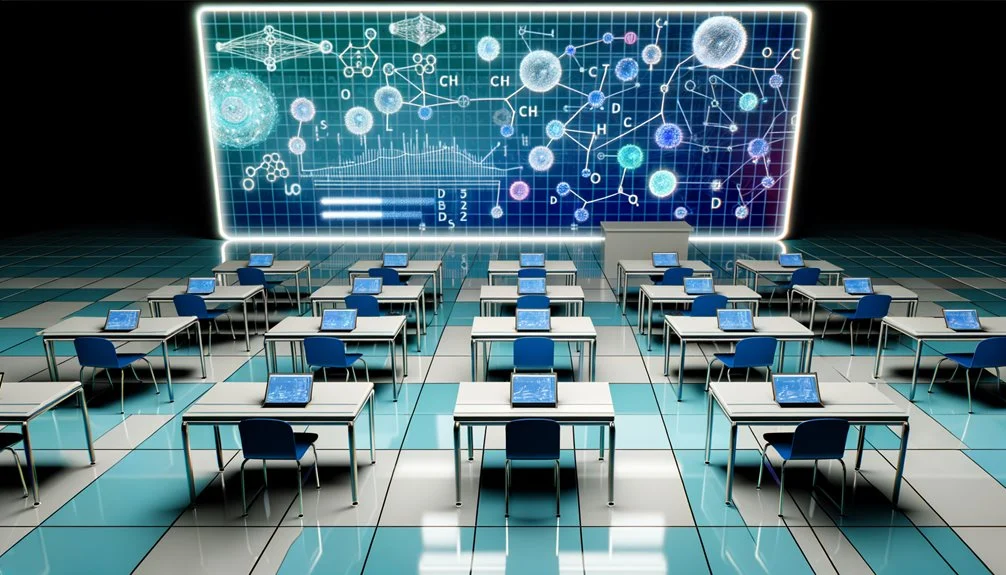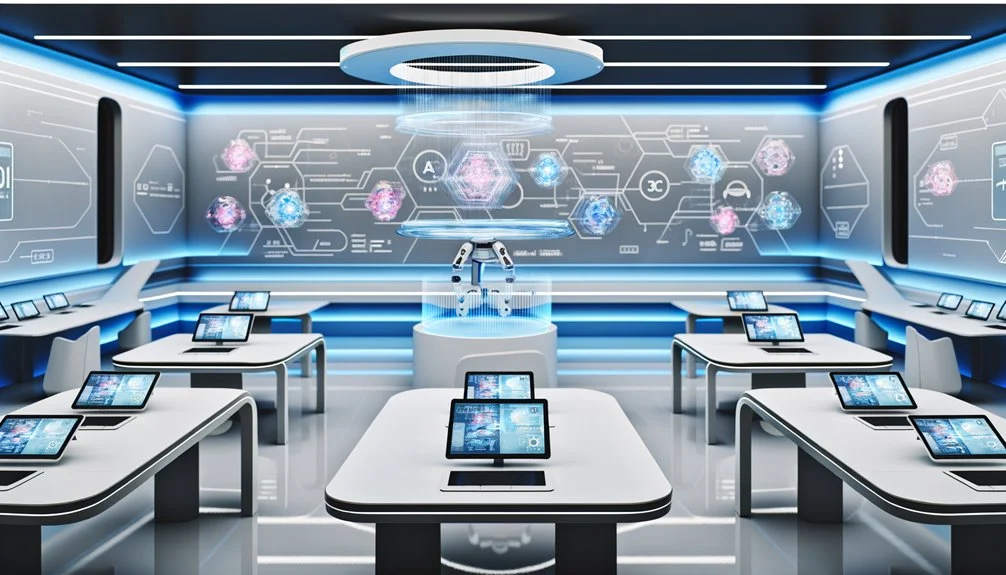AI in Education Systems. AI is transforming modern education by creating personalized learning experiences for students. It provides customized content that adapts to individual learning styles. Teachers benefit from automated grading and administrative tasks, giving them more time to focus on instruction. AI-powered tools offer real-time feedback, interactive lessons, and progress tracking. The educational technology market continues to grow as schools integrate these innovative solutions into their classrooms. Understanding AI’s impact on education reveals its expanding possibilities.
Key Takeaways
- AI enables personalized learning experiences by adapting content difficulty and pace to individual student needs and performance patterns.
- Automated administrative tasks and grading systems reduce teacher workload, allowing more time for meaningful student interactions.
- Real-time feedback systems provide immediate assessment and identify areas where students need additional support or intervention.
- AI-powered tools enhance accessibility through adaptive technologies and support features for students with diverse learning requirements.
- Interactive learning platforms use AI to create engaging educational experiences through simulations, virtual assistants, and customized content delivery.
The Rise of AI in Education Systems Powered Educational Technologies

As educational systems evolve in the digital age, AI-powered technologies are transforming how students learn and teachers work. These innovative tools are reshaping traditional classrooms through personalized learning experiences and streamlined administrative tasks.
AI-powered educational platforms now offer tailored content that adapts to individual learning styles. They’re helping teachers create customized materials, grade assignments, and track student progress more efficiently. This technology provides real-time feedback to students while reducing the time educators spend on administrative work. Data-driven approaches are becoming essential for creating more adaptive learning systems.
AI-driven platforms personalize education while empowering teachers to focus more on teaching and less on administrative tasks.
Schools are increasingly partnering with tech companies to integrate AI solutions into their curriculum. These tools assist with brainstorming, idea generation, and content creation. Nearly 43% of students do not use AI tools at all in their courses. Educational institutions investing in AI technology require computing infrastructure to support these advanced learning systems.
While adoption continues to grow, institutions are carefully considering privacy and security concerns. The education market is expanding as AI becomes more prevalent, leading to new opportunities for enhanced learning experiences and improved educational outcomes.
Transforming Learning Through Personalization and Engagement

The modern education system has undergone a significant transformation through AI-powered personalization and engagement tools. These systems analyze student performance to create customized learning paths that match individual learning styles and progress.
AI tools now deliver adaptive content that adjusts to each student’s pace and preferences, while providing instant feedback to help identify areas for improvement. Through interactive lessons, simulations, and games, students remain engaged and motivated in their learning journey. With digital acceleration emerging as a top priority, institutions are rapidly adopting AI solutions to enhance the learning experience.
The technology has shown impressive results, with studies indicating up to 30% improvement in retention rates through personalized learning experiences. AI also helps teachers by handling administrative tasks, allowing them to focus more on student interaction and support. Similar to data science principles, these AI systems enable more effective problem-solving and decision-making in educational settings.
These systems make learning more accessible for students with disabilities by offering specialized tools and strategies. The technology continuously monitors progress, analyzes data patterns, and adjusts teaching methods to guarantee the best learning outcomes for each student. The implementation of AI tools is expected to drive the EdTech market value to $404 billion by 2025.
Economic Growth and Investment in AI in Education Systems

Due to explosive market growth, investments in educational AI technology have reached unprecedented levels globally. The EdTech market is expected to reach $404 billion by 2025, with AI playing a significant role in this expansion. Leading countries like the U.S., China, and the U.K. are investing heavily in AI education solutions.
The market’s impressive 16.3% compound annual growth rate reflects the increasing demand for AI-powered learning tools. Companies are developing adaptive learning systems that personalize education for students, while also creating AI solutions for administrative tasks in schools. These investments are reshaping how students learn and how institutions operate. The rapid advancement of AI capabilities, with compute power doubling every five months, is accelerating the development of more sophisticated educational tools.
The broader education market is projected to reach $10 trillion by 2030, with AI technology driving much of this growth. Strategic partnerships between nonprofits and businesses are emerging to develop innovative educational solutions, though challenges like data privacy and ethical considerations remain important factors in this evolving landscape. Recent trends show workforce training growing at 6.5% annually, indicating strong demand for AI-enabled professional development solutions.
Building Future-Ready Education With AI Innovation

Modern education systems are rapidly evolving through AI innovation, creating future-ready learning environments for students worldwide. AI-driven tools are transforming how students learn and how teachers deliver instruction. These innovations help create personalized learning experiences that adapt to each student’s needs and pace. With 86% of students already incorporating AI tools into their academic work, the shift toward AI-enabled education is well underway.
- AI systems can detect learning patterns and automatically adjust content difficulty to match student abilities.
- Interactive AI teaching assistants make learning more engaging and provide real-time feedback.
- Automated scoring systems reduce teacher workload and provide faster assessment results.
- AI-enhanced curriculum development creates more adaptive and responsive learning materials.
- Accessibility tools powered by AI help students with disabilities access customized learning paths.
The integration of AI in education extends beyond basic automation. It’s reshaping teaching methodologies, improving student engagement, and creating more inclusive learning environments. High-poverty districts are falling behind in AI adoption, with suburban schools twice as likely to provide AI training. Similar to how modular design enables independent functioning of system components, AI education platforms can operate as standalone learning modules that seamlessly integrate into existing curricula.
As generative AI continues to grow, schools are preparing students for a technology-driven future through hands-on experience with AI tools.
Frequently Asked Questions
How Can Educators Maintain Human Connection While Implementing AI in Classrooms?
Educators can maintain human connections by using AI for administrative tasks, dedicating freed time to student interactions, fostering meaningful relationships, and implementing AI tools that enhance rather than replace personal engagement.
What Privacy Concerns Exist for Student Data Collected Through AI Systems?
Like a digital footprint in wet cement, student data privacy concerns include unauthorized access, potential breaches, long-term discrimination risks, commercial exploitation, and insufficient control over personal information collection and usage.
How Accessible Are AI Educational Tools for Schools With Limited Funding?
High costs and subscription fees limit AI tool accessibility in under-resourced schools. While some free options exist, they often lack advanced features and require infrastructure investments beyond many limited budgets.
What Skills Do Teachers Need to Effectively Integrate AI Technology?
Teachers require technical proficiency with AI tools, data analysis capabilities, pedagogical adaptation skills, continuous professional development, and the ability to implement personalized learning strategies while maintaining cultural sensitivity.
How Can Parents Support Their Children’s Learning With AI Tools?
Like skilled gardeners nurturing growth, parents can guide children to use AI tools responsibly, monitor usage, engage in ethical discussions, and create balanced learning experiences combining AI assistance with traditional methods.
Conclusion
AI’s powerful presence in education promotes practical, personalized paths for students to progress. Technology transforms traditional teaching by tailoring tasks to individual learning styles and speeds. Smart systems support students and teachers alike, making modern education more meaningful and manageable. As AI advances, it’ll continue creating collaborative classrooms where creativity and critical thinking combine with computational capabilities.


